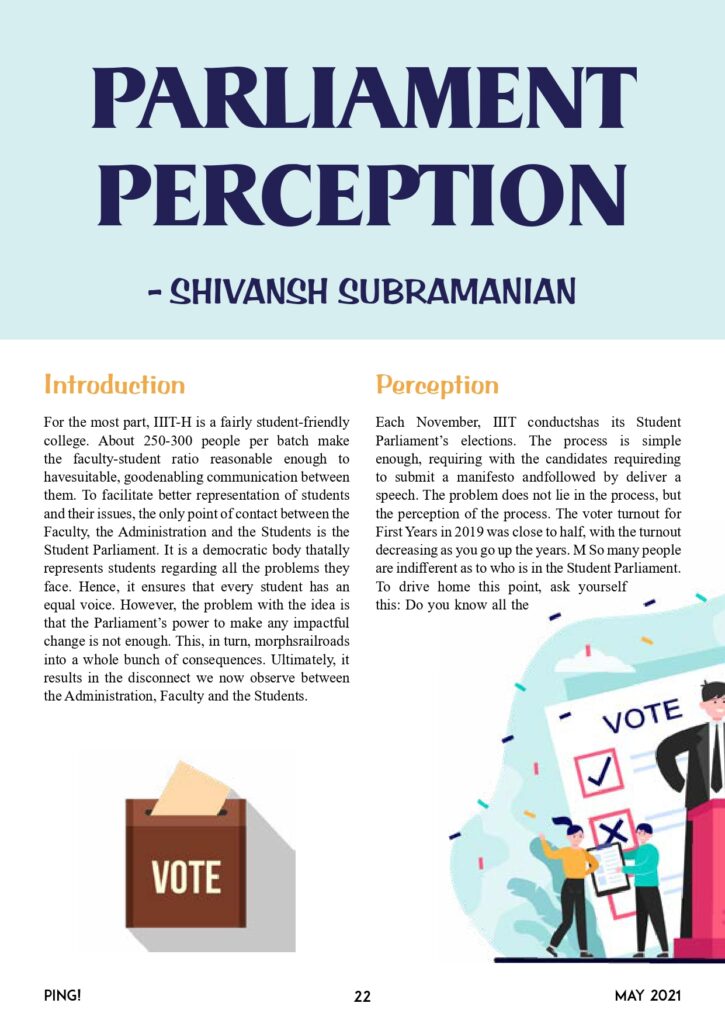Parliament Perception


Designed by Harshita Gupta
Introduction
For the most part, IIIT-H is a fairly student-friendly college. About 250-300 people per batch make the faculty-student ratio suitable, enabling communication between them. To facilitate better representation of students and their issues, the only point of contact between the Faculty, the Administration and the Students is the Student Parliament. It is a democratic body that represents students regarding all the problems they face. Hence, it ensures that every student has an equal voice. However, the problem with the idea is that the Parliament’s power to make any impactful change is not enough. This, in turn, morphs into a whole bunch of consequences. Ultimately, it results in the disconnect we now observe between the Administration, Faculty and the Students.
Perception
Each November, IIIT conducts its Student Parliament elections. The process is simple enough, requiring the candidates to submit a manifesto and deliver a speech. The problem does not lie in the process, but the perception of the process. The voter turnout for First Years in 2019 was close to half, decreasing as you go up the years. Many people are indifferent as to who is in the Student Parliament. To drive home this point, ask yourself this: Do you know all the candidates who stood for election in your year? A more straightforward question would be: Do you know the elected candidates from your year?
If the only point of contact to the Faculty and the Administration is the Parliament, then why would people be so indifferent to it? It is because the Administration, for the most part, governs the power to make significant changes. Another point which adds to this is the interactions with Parliament. Most students do not know what the Parliament does, or has done. A detailed report, which is too long to read, is released at the end of the term. Due to its lack of readability, most people ignore it or glance at it at the most. Since people do not end up reading it, it harms the Parliament’s perception, contradicting the very reason for which it is released.
Interactions
Continuing with this theme, we can argue that the Student Parliament does not sufficiently interact with the student body. Most students do not realise that activities are happening in college unless it is on Life@IIIT. Since the Parliament does not interact with students via this group, most students are unaware of what is happening most of the time. More frequent interactions would keep the student body more engaged and aware of the Parliament’s work. Engaging with the community more would, in turn, result in a better perception by the students.
The flip side of this coin poses how frequently the students interact with the Parliament or its members. Lack of any formal channel creates a scenario where one can only contact a Parliament member via text. Such communication often ends up not happening, due to it being such an informal means of communication. Now, assuming that a section of students do not know any of their Parliament Members well enough to contact them comfortably, we would end up with a lack of representation, resulting in a section of students unable to communicate their opinions effectively.
An example of this is women’s representation in Parliament. Since the vast majority of members are based in Bakul or OBH, it has led to a situation where Parijat issues remain unknown.
Power
The effectiveness of the Student Parliament is determined by its interaction with the Students and the Administration. For example, IIIT follows a strict policy of complete freedom for each course. Every professor gets to choose how to conduct the course, its assignments and evaluations. Hence, any input from the students regarding courses is considered only as suggestions. Any discontent must be resolved directly with the professor, where the Parliament cannot be involved.
For administrative decisions, the scene does not look any more optimistic. Almost all significant decisions are announced before the Parliament or any student is aware of it. Recently, the decision regarding the 2 Term plan and Diversity Pool fits this description. These policies were formed and finalised without any role played by the Student Parliament. It is to be noted that after the formation of such policies, the Administration did hear the Parliament’s advice on it, which were considered as suggestions. For example, the two term approach was removed by the Administration after meeting with the Parliament due to the majority of students being against it. Such instances have led to the general feeling that the Student Parliament is not supported by the Administration, since significant decisions do not have their input in any way.
The Parliament does have a say in smaller administrative decisions, but the process often hampers any progress. There are committees which must be approached for almost all decisions, which increases the time requirement. On a positive note, some committees like Mess and Hostel interact well with the Student Parliament. Decisions regarding these are made quickly and aptly.
Conclusion
The indifference with which most students view the Student Parliament can be traced back to the Parliament itself. Lesser interactions, lack of a formal channel, lack of regular updates all lead to a general feeling that the Parliament is not involved in most issues. For significant problems, the Administration needs to be proactive in involving the Parliament before decisions are taken. This would lead to students acknowledging the role of the Parliament and hence would garner more respect. Having a formal channel of complaints or suggestions would help involve more students as well, leading to a more well-represented Parliament.
Editor: Rohan Grover

 We Are So Cooked
We Are So Cooked  Qu’ils mangent de la grenouille! (Let Them Eat Frogs!)
Qu’ils mangent de la grenouille! (Let Them Eat Frogs!)  Tale of Two Cheenties
Tale of Two Cheenties  Peace of mind.
Peace of mind.  Boats and Valorant
Boats and Valorant  Blessings
Blessings  Cleaning up the Mess?
Cleaning up the Mess?
1 thought on “Parliament Perception”
Comments are closed.